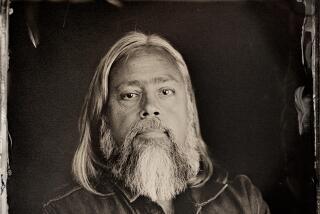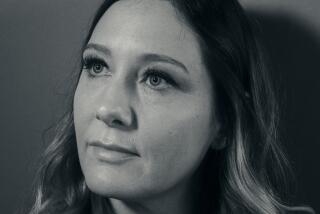A language too beautiful to lose
- Share via
ONLY three Native American languages now spoken in the United States and Canada are expected to survive into the middle of this century. Mine, Ojibwe, is one of them. Many languages have just a few speakers left -- two or three -- while some have a fluent population in the hundreds. Recently, Marie Smith Jones, the last remaining speaker of the Alaskan Eyak language, died at age 89. The Ojibwe tribe has about 10,000 speakers distributed around the Great Lakes and up into northwestern Ontario and eastern Manitoba. Compared with many, we have it pretty good.
If my language does die -- not now, not tomorrow, but, unless something changes, in the near future -- many understandings, not to mention the words that contain them, will die as well. If my language dies, our word for “bear,” makwa, will disappear, and with it the understanding that makwa is derived from the word for box, makak (because black bears box themselves up, sleeping, for the winter).
So too will the word for “namesake,” niiyawen’enh. Every child who gets an Ojibwe name has namesakes, sometimes as many as six or eight of them. Throughout a child’s life, his or her namesakes function a little like godparents, giving advice and help, good for a dollar to buy an Indian taco at a powwow. But they offer something more too. The term for “my body,” niiyaw (a possessive noun: ni- = “I/mine”; -iiyaw = “body/soul”), is incorporated into the word for a namesake because the idea (contained by the word and vice versa) is that when you take part in a naming, you are gifting a part of your soul, your body, to the person being named. So, to say “my namesake,” niiyawen’enh, is to say “my fellow body, myself.”
If these words are lost, much will happen, but also very little will happen. We will be able to go to Starbucks and GameStop and Wal-Mart and the Home Depot as before. We will tie our shoes the same way and brush our teeth and use Crest Whitestrips. Some of us will still do our taxes. Some of us still won’t. The mechanics of life as it is lived by modern Ojibwes will remain, for the most part, unchanged. The language we lose, when we lose it, is replaced by other languages.
And yet, I think, more will be lost than simply a bouquet of discrete understandings -- about bears or namesakes. If the language dies, we will lose something personal, a degree of understanding that resides, for most fluent speakers, on some unconscious level. We will lose our sense of ourselves and our culture. There are many aspects of culture that are extralingual -- that is, they exist outside or in spite of language: kinship, legal systems, governance, history, personal identity. But there is very little that is “extralingual” about story, about language itself. I think what I am trying to say is that we will lose beauty -- the beauty of the particular, the beauty of the past and the intricacies of a language tailored for our space in the world.
Yes, that’s it: We will lose beauty.
My older brother Anton and I, among many others, have been trying to do something about that. For the last year, we have been working on a grant to record, transcribe and translate Ojibwe speech in order to compile what will be the first (and only) practical Ojibwe language grammar. Since December, we have traveled once, sometimes twice, a week, from our homes on the western edge of our Minnesota reservation to the east, to small communities named Inger, Onigum, Bena and Ball Club, where we record Ojibwe speakers. We’ve also taken longer trips to Red Lake Reservation (to the north) and south to Mille Lacs.
--
RECORDING Ojibwe speech in Minnesota, where the average age of fluent Ojibwe speakers is 55, means recording old people. My brother, at 38, is very good at this, much better than I am. For starters, he is much more fluent. And he looks like a handsome version of Tonto: lean, medium height, clear eyes and smooth face, very black shiny braids and very white shiny teeth. This helps. He has made this kind of activity his life’s work; it is what he does.
Right after college, he apprenticed himself to Archie Mosay, at that time the oldest and most influential Ojibwe spiritual leader, who grew up in the hills of the St. Croix River Valley in Wisconsin and did not have an English name until he was 12 and a white farmer he worked for gave him a pocket knife and the name “Archie.” He kept the knife and the name for another 82 years. Archie and my brother were friends. Deep affection and respect and tenderness ran in both directions.
The people we are interviewing are also our friends. There is Tom Stillday, from the traditional village of Ponemah on the Red Lake Reservation. Tommy Jay, as he’s known, is somewhat famous for his spiritual work and for his sense of humor; he refers to his knees as his baakinigebishkigwanan, which means “openers,” and once he described his Indian name, Ozaawaabiitang (Yellow Foam), as the “puke of the waves as they wash up onshore.” He is a Korean War combat veteran, has served on the tribal council and was the spiritual advisor for one or two sessions of the Minnesota Senate. He is also my daughter’s namesake.
Then there is Anna Gibbs, also from Ponemah, also famous -- for her voice and her special and spectacular brand of endearing crabbiness and her wild salt-and-pepper hair. Anna can be scary if you don’t know her. She is abrupt and short, not more than 5 feet tall, one leg 2 inches shorter than the other (a condition she suffered through until just a few years ago when she finally got a few sets of orthopedic shoes). But she has the most beautiful Ojibwe name of Waasabiik, which describes the way moonlight will winkle on the water on an almost still night. She is my son’s namesake.
--
THERE is also Eugene Stillday, perhaps the best storyteller of them all. He is from Ponemah, Tommy Jay’s first cousin. As we recorded him, he told stories of staging powwows out in the woods, of using his grandmother’s wash tub as a drum until it caved in, of making a boxing ring with vines and of one harrowing winter when his entire family was near death from influenza and he sat by the stove, feeding it wood and watching the flames through the grate, until his uncle, Tommy’s father, walked through the snow and took Eugene to his house, where he was given two slices of bread, before his uncle returned to feed the stove and nurse the family back to health.
Anton is able to draw these stories out of our elderly friends with enviable ease. He’s been doing that -- without funding or help or a fancy award -- for the last 15 years. He is a people person, I suppose. And I am more of a book person. I think it will take both for our language to survive. We will need things like a grammar and more complete dictionaries and databases of recorded speech. But we will also need people, because languages cannot live without them. Languages can be stored without people to act as the shelves, but they cannot be retrieved except by human grasping.
Since we’ve begun our project, six of our informants, our friends, have died, including Mark Wakanabo, who worked as a janitor at our tribal school for decades until someone realized that since he was a fluent speaker, it would be better if he pushed young minds toward the language rather than pushed a broom. He was a sweet man, about whom I knew very little, except that he was gentle, with a soft voice. Two of his sons (identical twins) were my friends through middle and high school.
Luckily, other people are working on making more Ojibwe speakers. My good friends Keller Paap, along with his wife Lisa LaRonge, David Bisonette, Thelma Nayquonabe, Harold Frogg, Rose Tainter, Monica White and others, have started an Ojibwe language immersion school named Waadookodaading (We Help Each Other) on the Lac Courte Oreilles Reservation in north-central Wisconsin. The school has been in operation for six years, and all the children in the program have passed fifth-grade aptitude tests mandated by the state of Wisconsin. Sixty-six percent of them scored in the top 10 percentiles in English and math, compared with a much lower passing rate among students in the tribal and public schools on and near the reservation. And yet the students at Waadookodaading received no instruction in English and their math was taught in Ojibwe.
--
LAST spring, I went spearing with Keller Paap and Dave Bisonette on a lake in their treaty area. Band members fought for and won the right to continue exercising their treaty rights on ceded land, and so they do. One of those rights is to spear and net walleye pike during the spring spawn. It is cold on the water in April, and it was that night. We took the boat across Round Lake to the northeastern shore and into the shallow waters where the fish spawn. One person ran the motor, the other stood in front wearing a headlamp and speared the fish with a long pole. With a few modern modifications, this is something we have done for centuries.
The night was very foggy. Mist skated over the water and billowed up, disturbed, over the gunwales of the boat. We kept close to shore. Round Lake is a resort lake and many of its bays and inlets are packed with houses. (It is rumored that Oprah Winfrey has a house there.) Most of these places were closed up, shuttered, waiting for the tourists to come in for the summer. The docks reached down into the lake as if testing the water, but finding it too cold, drew up halfway on the banks. Yet here and there, lights shone from living room windows. And when the house was perched especially close to the lake, we could see televisions glowing ghostly and blue.
It was past 10 -- time for Letterman and Leno. Dave and Keller and I spoke Ojibwe over the puttering motor and the watery stab of the spear going down into the water and the clang as it came out with a walleye wiggling against the barbs. The pile of fish grew on the bottom of the boat, and they flapped dully, trying to fly against the unforgiving aluminum sky of the boat. A dog barked from shore. I could hear, clearly, Letterman’s Top Ten List coming from an open window. Fish scales, knocked loose by the tines of the spear, were plastered all over the inside of the boat, and they sparkled like jewels when swept by the lamplight.
This way of life and the language that goes with it felt suddenly, almost painfully, too beautiful to lose; too impossibly beautiful and unique to be drowned out by the voice of a talk show host or by any other kind of linguistic static. And I thought then, with a growing confidence I don’t always have: We might just make it.
More to Read
Sign up for The Wild
We’ll help you find the best places to hike, bike and run, as well as the perfect silent spots for meditation and yoga.
You may occasionally receive promotional content from the Los Angeles Times.






